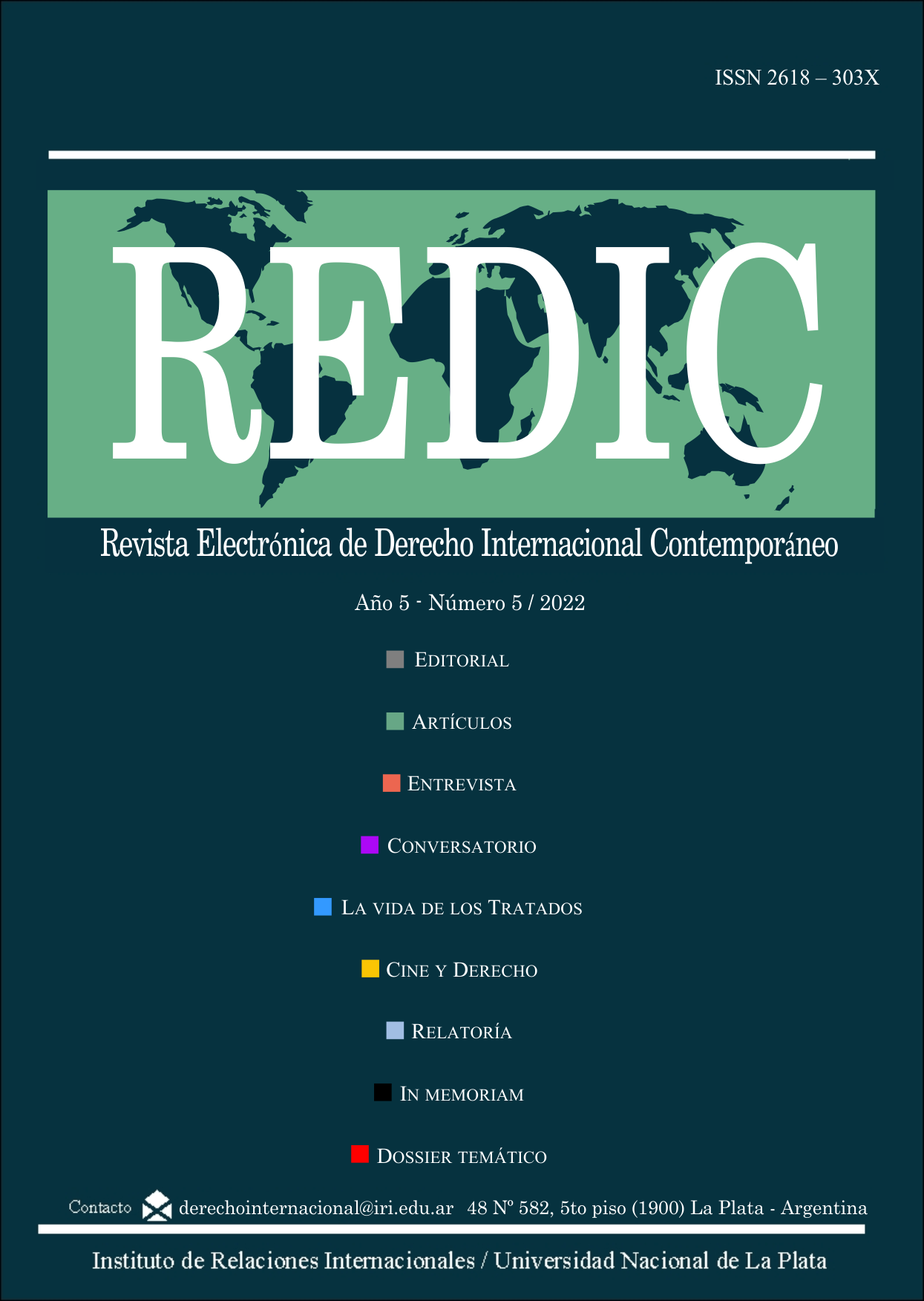L’ Amérique latine, l’ALBA-TCP et l’arbitrage transnational en matière d’investissement: la fondation d’une mosaïque de résistance
DOI :
https://doi.org/10.24215/2618303Xe032Mots-clés :
Amérique latine, ALBA-TCP, Arbitrage, CIRDI, investissementRésumé
L'Amérique latine représente un véritable laboratoire pour l'arbitrage international d'investissement. Elle est à la fois à l'origine de la discipline et au cœur des critiques et des changements qui l'affectent. Si les contestations des effets de l'arbitrage sont venues du monde entier, elles ont eu une résonance particulière dans la région, en raison de l'attitude traditionnellement hostile des pays de la région à l'arbitrage d'investissement. Cet article propose de revisiter la mosaïque de la résistance, qui a donné naissance à un projet contre-hégémonique alternatif dans la région. Il conclut que les mouvements de résistance en Amérique latine contre l'arbitrage d'investissement n'ont finalement pas bénéficié d'un soutien majoritaire clair et que plusieurs pays ont adopté une position ambiguë vis-à-vis de ces mouvements. En l'absence d'une solution globale cohérente, les propositions alternatives soutenues par les États sont plurielles et dispersées et sont pour la plupart éloignées de l'approche radicale mise en avant par l'ALBA-TCP.
Références
Actis, E. (2015). Brasil frente al orden internacional liberal (2011-2013): los límites de la posición reformista a la luz del régimen internacional de inversiones. Mural Internacional, 6(1), 22-34.
ALBA. (2009). Fundamental Principles of the Peoples' Trade Treaty-TCP, Principle 16, VII Summit. Cochamba.
ALBA. (2012). Agreement for the Creation of the Economic Space of ALBA-TCP.
ALBA. (2012). Agreement for the Creation of the Economic Space of ALBA-TCP (ECOALBA-TCP). XI Summit-Caracas.
ALBA. (2013, July 30). Special Resolution on Arbitration and Transnational and Transnational Companies, XII Summit, Guayaquil, Ecuador.
ALBA. (2013, July 30). Special Resolution on Arbitration and Transnational Companies, XII Summit.
ALBA-TCP. (2010). Construyendo un Mundo Pluripolar, Cumbres 2004-2010.
Alvarez, J. E. (2011). The Return of the State. Minnesota Journal of International Law, 223-264.
Anghie, A. (1999). Finding the Peripheries: Sovereignty and Colonialism in Nineteenth-Century International Law. Harvard International Law Journal, 40(1), 1-71.
Bácares, D. C. (2010). El derecho de las inversiones en América Latina: el reencuentro con los derechos humanos. In L. VIDAL, & C. ROBERTO, Realidades y tendencias del derecho en el Siglo XXI. Filosofia e Historia del Derecho (Vol. 4). Bogotá: Editorial Temis.
Behn, D. e. (2022). The Legitimacy of Investment Arbitration. Empirical Perspectives. Cambridge: Cambridge University Press.
Bellei Tagle, C. (2016). Arbitraje de inversiones en América Latina: de la hostilidad a la búsqueda de nuevas alternativas. In A. TANZI, A. ASTERITI, & R. P. LAZO, International Investment Law in Latin America/Derecho internacional de las inversiones en América Latina: Problems and Prospects/Problemas y Perspectivas. Leyde: Brill.
Ben Hamida, W. (2003). L'arbitrage transnational unilatéral: réflexions sur une procédure réservée à l'initiative d'une personne privée contre une personne publique. Paris: Thèse de doctorat en droit privé, Université Paris 2.
Brekoulakis, S. (2013). Systemic Bias and the Institution of International Arbitration: A New Approach to Arbitral Decision-Making. Journal of International Dispute Settlement, 4(3), 553-585.
Brower, C. N., & Sharpe, J. (2003). The Coming Crisis in the Global Adjudication System. Arbitration International, 19(4), 415-440.
Calvert, J. (2018). Civil Society and Investor-State Dispute Settlement: Assessing the social dimensions of investments disputes in Latin America. New political economy, 23(1), 46-65.
Calvo, C. (1896). Droit international théorique et pratique. Précédé d'un exposé historique des progrès de la science du droit des gens,. Paris: A. Rousseau.
Castro Peña, M. N. (2017). El Estado colombiano ante un arbitraje internacional de inversión. Revista Derecho del Estado2017(38), 23-66.
CEPAL. (2020). La Inversión Extranjera en América Latina y el Caribe. United Nations.
Choudhary, V. (2022). Preventing Frivolous Counterclaims in Investor-State Arbitration: Need for Summary Dismissal Procedures. European Yearbook of International Economic Law 2021, 1-30.
CIJ (1970). Affaire de la Barcelona Traction. Opinion individuelle.
Crivelli, A. (2015). El capital extranjero en Argentina. Ciclos en la historia, la economía y la sociedad, 24(44), 69-92.
Daválos Fernández, R. (2011). La proposition de la Cour d'arbitrage OHADAC. Arbitraje. Revista de Arbitraje Comercial y de Inversiones, 4(1), 139-157.
Dawson, F. G. (1986). The Influence of Andres Bello on the Latin-American Perceptions of Non-Intervention and State Reponsibility. British Yearbook of International Law, 57(1), 253-315.
De Alba Uribe, M. T. (2013, mai 21). Investment Arbitration and Latin America: Irreconciable Differences? Retrieved from Kluwer Arbitration Blog: http://arbitrationblog.kluwerarbitration.com/2013/05/21/investment-arbitration-and-latin-america-irreconcilable-differences
Diaz, F. C. (2009). ALBA Moves Forwardwith Plan to Create Regional Investment Arbitration Alternative to ICSID at 7th Summit. Retrieved from Investment Treaty News.
Diel-Gligor, K. (2017). Towards Consistency in International Investment Jurisprudence: A Preliminary Ruling System for ICSID Arbitration. Leyde: Brill.
Dorce, M. J. (2020). L'émergence du standard minimum de traitement des étrangers en droit international. Les Annales de droit(14), 9-36.
Drago, L. M. (1907). Les emprunts d'état et leurs rapports avec la politique internationale. Paris: A. Pedone.
Elizondo, C. J. (2022). Latin America and International Investment Law: A mosaic of resistance. Manchester: Manchester University Press.
Feldman, M. (2017). Investment Arbitration Appellate Mechanism Options: Consistency, Accurancy, and Balance of Power. ICSID Rev, 32(3), 528-544.
Fiezzoni, S. K. (2011). The challenge of UNASUR member countries to replace ICSID arbitration. Beijing L. Rev., 2, 135-144.
Franck, S. D. (2004). The Legitimacy Crisis in Investment Treaty Arbitration: Privatizing Public International Law through Inconsistent Decisions. Fordham L. Rev, 73(4), 1521-1625.
Gaillard, E. (2007). The denunciation of the ICSID Convention. TDM, 4(5).
Galeano, E. (1981). Les veines ouvertes de l'Amérique latine: Une contre-histoire. Paris: Librairie Plon, Coll. Terre humaine.
Giupponi, B. (2019). Trade agreements, investment protection and dispute settlement in Latin America. Leiden: Kluwer.
Global Arbitration Review. (2015, février 24). Venezuela versus the ICSID Convention. Retrieved from http://globalarbitrationnews.com/venezuela-versus-icsid-convention-20120422/
Gomez, K. F. (2011). Latin America and ICSID: David versus Goliath. Law & Bus. Rev. Am, 17(2), 195-230.
Grigera Naón, H. A. (2005). Arbitration and Latin America: Progress and Setbacks 2004 Freshfields Lecture. Arbitration international, 21(2), 127-176.
Gutiérrez Haces, M. T. (2016). L'investissement étranger et l'activité minière en Amérique latine. Les stratégies gouvernementales dans les conflits avec les compagnies minières. IdeAs.
Guzmann, A. T. (1997). Why LDCs sign treaties that hurt them: Explaining the popularity of bilateral investment treaties. Va. j. int'l L, 38.
Hamilton, J. C. (2008). Three Decades of Latin American Commercial Arbitration. U. Pa. J. Int'l L, 30(4), 1099-1119.
Hippolyte, A. R. (2017). ICSID's Neoliberal Approach to Environmental Regulation in Developing Countries: Lessons from Latin America. International Community Law Review, 19, 401-442.
Hodgson, M. N. (2020). Reform and Adaptation: The Experience of the Americas with International Investment Law. The Journal of World Investment & Trade, 21(1), 140-166.
Kaufmann-Kohler, G. (2007). Arbitral Precedent: Dream, Necessity or Excuse. Arbitration International, 357-378.
Kurtz, J. (2010). The paradoxical treatment of the ILC articles on state responsibility in investor-state arbitration. ICSID Review, 25(1), 200-217.
Leben, C. (2015). Droit international des investissements et de l'arbitrage transnational. Paris: Pedone.
Leonharsdsen, E. M. (2012). Looking for legitimacy: exploring proportionality analysis in investment treaty arbitration. Journal of International Dispute Settlement, 3(1), 95-136.
Levine, E. (2011). Amicus Curiae in International Investment Arbitration: The Implications of an Increase in Third-Party Participation. Berkeley J. Int'l L, 29(1), 200-224.
Lim, C. L., Ho, J., & Paparinskis, M. (2021). International Investment Law and Arbitration. Commentary, Awards and Other Materials. Cambridge: Cambridge University Press.
Lowenfield, A. F. (2003). International Economic Law. Oxford, USA: Oxford University Press.
Lubambo, M. (2016). Is State-State Investment Arbitration an Old Option for Latin America? Conflict Resolution Quarterly, 34(2), 225-247.
Maggetti, M., & Moraes, H. C. (2018). The Policy-Making of Investment Treaties in Brazil: Policy Learning in the Context of Late Adoption. In C. A. Dunlop, Learning in public policy: analysis, modes and outcomes (pp. 295-316.). Cham: Palgrave.
Manigat, L. F. (1969). Les États-Unis et le secteur caraïbe de l'Amérique latine. Revue française de science politique, 19(3), 645-683.
Mbengue, M. M., & Schacherer, S. (2017). The 'Africanization' of international investment law: the Pan-African Investment Code and the reform of international investment regime. The Journal of World Investment & Code, 18(3), 414-448.
Mezgravis, A. A., & González, C. (2012). Denunciation of the ICSID Convention: Two Pwoblems, One Seen and One Overlooked. TDM, 9(7).
Miles, K. (2013). The Origins of International Investment Law. Empire, Environment and the Safeguarding of Capital. Cambridge: Cambridge University Press.
Monebhurrun, N. (2017). Novelty in international investment law: the Brazilian agreement on cooperation and facilitation of investments as a different international investment agreement model. Journal of International Dispute Settlement, 8(1), 79-100.
Montt, S. (2009). State liability in investment treaty arbitration: global constitutional and administrative law in the BIT generation. London, UK: Bloomsbury Publishing.
Moraes, H. C., & Pérez, A. F. (2022). Pluralist approaches to dispute settlement mechanisms. In S. Droubli, & C. J. Elizondo, Latin America and international investment law: A mosaic of resistance (pp. 89-103). Manchester: Manchester University Press.
Moreno, C. (2007). Integración Latinoamericana: ALCA contre ALBA. Presente y Pasado. Revista de Historia, 155-178.
Mourre, A. (2006). Perspectives of International Arbitration in Latin America. Am. Rev. Int'l Arb, 17, 597-601.
Odumosu, I. T. (2007). The Law and Politics of Engaging Resistance in Investment Dispute Settlement. Penn St. Int'l L. Rev, 26(2), 251-287.
Pérez Toruńo, H. A. (2016). Análisis al régimen normativo de la inversión extranjera directa como principal garantía de seguridad jurídica en Nicaragua. Thèse de doctorat.
Pérez-Aznar, F., & Moraes, H. C. (2017). The MERCOSUR Protocol on Investment Cooperation and Facilitation: regionalizing an innovative approach to investment agreements.
Polanco, R. (2014). Is There a life for Latin American Countries after Denouncing the ICSID Convention? TDM, 11(1), 1-57.
Prieto Munoz, J. G. (2017). Ecuador's 2017 Termination of Treaties: How not to exit the international investment regime. Braz. J. Int'l L, 14, 179-191.
Puig, S. (2019). Contextualizing Cost-Shifting: A Multi-Method Approach. VJIL, 58(2), 262-308.
Remmer, K. L. (2019). Investment Treaty Arbitration in Latin America. Latin American Research Review, 54(4), 795-811.
Reynolds, J. (2011). The Political Economy of States of Emergency. Oregon Review of International Law, 14(85), 85-118.
Roberts, A. (2018). Incremental, systemic, and paradigmatic reform of investor-state arbitration. American Journal of International Law, 112(3), 410-432.
Robertson, W. S. (1922). History of the Latin American Nations. Boston: D. Appleton and Company.
Salacuse, J. W., & Nicholas, P. S. (2005). Do BITs Really Work? An Evaluation of Bilateral Investment Treaties and Their Grand Bargain. Harvard International Law Journal, 46, pp. 67-130.
Sarmiento, M. (2015). The Bolivarian Alliance for the Peoples of Our America Trade Treaty (ALBA-TCP) and the creation of a Centre for the settlement of investment disputes. SSRN 2702419.
Schultz, T., & Dupont, C. (2015). Investment Arbitration: Promoting the Rule of Law or Over-Empowering Investors? A Quantitative Study. EJIL, 25(4), 1147-1168.
Shea, D. R. (1955). The Calvo Clause: A problem of inter-American and international law and diplomacy. Minneapolis, Minnesota: University of Minnesota Press.
Sornarajah, M. (2008). A Coming Crisis: Expansionary Trends in Investment Treaty Arbitration. In K. P. Sauvant, Appeals Mechanism in International Investment Disputes. Oxford: Oxford University Press.
Tamayo-Álvarez, R. (2020). David Aven v Costa Rica: A step forward towards investor accountability for environmental harm? Review of European, Comparative & International Environmental Law, 29(2), 301-306.
Tienhaara, K. (2011). Regulatory Chill and the Threat of Arbitration: A view from Political Science. In C. Brown, & K. Miles, Evolution in Investment Treaty Law and Arbitration. Cambridge, UK: Cambridge University Press.
Titi, C. (2014). Investment arbitration in Latin American : the uncertain veracity of preconceived ideas. Arbitration international, 30(2), 357-386.
Titi, C. (2016). Most-favoured-nation treatment: survival clauses and reform of international investment law. Journal of International Arbitration, 33(5), 425 – 440.
Todd, W. (2010). Philip Morris vs. Uruguay: An Analysis of Tobacco Control Measures in the Context of International Investment Law. Retrieved from Report #1 for Physicians for a Smoke Free Canada: http://www.smoke-free.ca/eng_home/2010/PMIvsUruguay/Opinion-PMI-Uruguay.pdf
Tzanakopoulos, A. (2011). Denunciation of the ICSID Convention under the General International Law of Treaties. In R. Hofmann, & C. J. Tams, International Investment Law and General International Law: From Clinical Isolation to Systemic Integration (pp. 75-93). Baden-Baden, Allemagne: Nomos.
UNCTAD. (n.d.). International Investment Agreements. Retrieved from https://investmentpolicy.unctad.org/international-investment-agreements
UNCTAD. (n.d.). Investment Dispute Settlement Navigator, Known treaty based ISDS cases. Retrieved from UNCTAD: https://investmentpolicy.unctad.org/investment-dispute-settlement
Van Den Berg, A. (2013). Time and Costs: Issues and Initiatives from an Arbitrator's Perspective. ICSID Rev, 28(1), 218-222.
Van Harten, G. (2012). Arbitrator Behaviour in Asymmetrical Adjudication: An Empirical Study of Investment Treaty Arbitration. Osgoode Hall L.J, 50(1), 211-268.
Waibel, M. (2010). The Backlash against Investment Arbitration: Perceptions and Reality. Alphen aan den Rijn: Kluwer.
Zamora, S. (1997). Allocating Legislative Competence in the Americas: The Early Experience under NAFTA, and the Challenge of Hemispheric Integration. In S. ZAMORA, El papel del derecho internacional en América. La soberanía nacional en la era de la integración regional (pp. 53-74). México: Universidad Nacional Autónoma de México.
Téléchargements
Fichiers supplémentaires
Publié
Numéro
Rubrique
Licence
© Dorce Milcar Jeff 2022

Cette œuvre est sous licence Creative Commons Attribution - Pas d'Utilisation Commerciale - Partage dans les Mêmes Conditions 4.0 International.
Aquellos autores/as que tengan publicaciones con esta revista, aceptan los términos siguientes:
- Los autores/as conservarán sus derechos de autor y garantizarán a la revista el derecho de primera publicación de su obra, el cuál estará simultáneamente sujeto a la Licencia de reconocimiento de Creative Commons (BY-NC-SA) 4.0 que permite a terceros compartir la obra siempre que se indique su autor y su primera publicación esta revista, no se haga uso comercial, y si se remezcla, se transforma o se crea a partir del material, se debe distribuir bajo la misma licencia del original.
- Los autores/as podrán adoptar otros acuerdos de licencia no exclusiva de distribución de la versión de la obra publicada (p. ej.: depositarla en un archivo telemático institucional o publicarla en un volumen monográfico) siempre que se indique la publicación inicial en esta revista.
- Se permite y recomienda a los autores/as difundir su obra a través de Internet (p. ej.: en archivos telemáticos institucionales o en su página web) antes y durante el proceso de envío, lo cual puede producir intercambios interesantes y aumentar las citas de la obra publicada. (Véase El efecto del acceso abierto).































